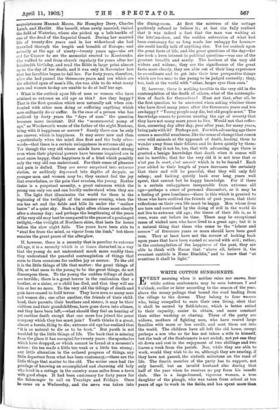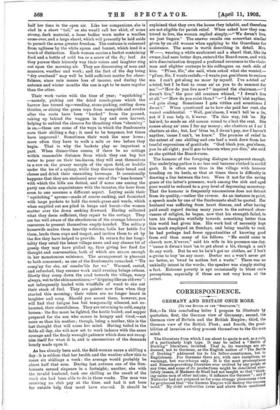WHITE COTTON SUNBONNETS.
EVERY morning when it neither rains nor snows, four white cotton sunbonnets may be seen between 7 and 8 o'clock, earlier or later according to the season of the year, above the mossy palings that bound the road leading from the village to the downs. They belong to four women who, being compelled to earn their own living, elect that it shall be earned by field-labour, which is better suited to their capacity, easier to obtain, and more constant than either washing or charing. Three of the party are widows, mothers of fighting men, who have reared large families with more or less credit, and sent them out into the world. The children have all left the old home, except perhaps a eon who so far has not taken a wife to himself, but the task of the Sunbonnets is not ended; not yet can they sit down and rest in the enjoyment of two shillings and two loaves a week from the parish. Nor, while they are able to work, would they wish to do so, although they are nearing, if they have not passed, the sixtieth milestone on the road of life. The fourth member of the party has to support, not only herself, but an invalid husband also during that half of the year when he receives no pay from his benefit club. She is a large-framed, vigorous woman, a true daughter of the plough, who was taken from school at ten years of age to work in the fields, and has spent more than
half her time in the open air. Like her companions, she is clad in a short "tail," as she would call her skirt, of some strong, dark material, a loose bodice worn under a woollen cross-over, and a large shawl, which will presently be laid aside to permit the arms greater freedom. The costume is redeemed from ugliness by the white apron and bonnet, which lend it a touch of distinction. Each woman carries a basket containing food and a bottle of cold tea or a screw of the dry leaf. As they pursue their leisurely way their voices and laughter ring out upon the morning air. They are discoursing of men and manners, weather and work ; and the fact of the day being "dry overhead" may well be held sufficient matter for cheer- fulness, since rain means loss of income, and during the autumn and winter months the one is apt to be more regular than the other.
Their work varies with the time of year; " squitching " —namely, picking out the dried couch-grass which the harrow has turned up—weeding, stone-picking, cutting down thistles, or slicing the green tops from mangolds and swedes after the roots have been " hucked" from the ground, raking up behind the waggon in hay and corn harvest, helping to unbind the sheaves for thrashing when "sheening" is on,—these are some of the ways in which the Sunbonnets earn their shilling a day ; it used to be tenpence, but times have improved ! Sometimes their work lies near home ; more often they have to walk a mile or two before they begin. That is why the baskets play so important a part. When dinner-time comes, if there be no cottage within reasonable distance from which they can beg hot water to pour on their tea-leaves, they will seat themselves in a row on the grassy margin of the open field, or huddle under the lee of a spinny, while they discuss their bread and cheese and drink their unexciting beverage. It occasionally happens that they are stationed near one of the "lone housen" with which the hills are dotted, and if some one among the party can claim acquaintance with the inmates, the hour from noon to one assumes a different aspect. Laying aside their " squitching " aprons—made of coarse sacking, and furnished with large pockets to hold the couch-grass and weeds, which when emptied out are piled in heaps and burnt—the women scatter over the down seeking firewood. Having collected what they deem sufficient, they repair to the cottage. They are too well aware of the slenderness of the average labourer's resources to present themselves empty-handed. The solitary housewife makes them heartily welcome, boils her kettle for them, lends them cups and teapot, and invites them to sit by the fire they have helped to provide. In return for her hospi- tality they retail the latest village news and any chance bit of gossip they may have picked up, thus giving her food for thought and conversation, both of which are scacce enough in her monotonous existence. The arrangement is pleasant to both concerned ; as one of the Sunbonnets remarked. " 'Tis comp'ny fur she, an' comfer'ble fur we." Warmed, rested, and refreshed, they resume work until evening brings release. Slowly they creep down the road towards the village, weary always, wet to the skin sometimes,—" dripping like an old ewe"; not infrequently loaded with windfalls of wood to eke out their stock of fuel. They are quieter now than when they started this morning ; their voices are no longer beard in laughter and song. Should you accost them, however, you will find that fatigue has but temporarily silenced, not ex- hausted, their cheerfulness. They are returning to cold, empty houses : the fire must be lighted, the kettle boiled, and supper prepared for the son who comes in hungry and tired,—not more so than his mother ; though, being a mother, this is the last thought that will cross her mind. Having toiled in the fields all day, she will now set to work indoors with the same courage and the finely wrought patience which does not recog- nise itself for what it is, and is unconscious of the demands hourly made upon it.
As has already been said, the field-woman earns a shilling a day : it is seldom that her health and the weather allow this to mean six shillings a week : the average would probably be about half that sum. During last autumn one of the Sun- bonnets earned sixpence in a fortnight; another, she with the invalid husband, took one shilling as the result of the work she had been able to do in three weeks. The man was receiving no club pay at the time, and had it not been for outside help they must have starved. It should be explained that they own the house they inhabit, and therefore are not eligible for parish relief. When asked how they con- trived to live, the woman replied simply,—" We dwun't live, we just lingers." The answer recalls one somewhat similar given by an old woman when applying to the Guardians for assistance. The scene is worth describing in detail. Mrs. W—, wearing a white sunbonnet and a shawl that, like its owner, had seen better days, entered the Board-room, and with nice discrimination dropped a profound reverence to the chair- man and slighter curtseys to his colleagues on each side of him. "Pl'ase, Sir," she said, when asked what she wanted,— " prase, Sir, I wants reelafe,—I wants you gen'elmen to reelave ma. I can't get along no moor by myself. I've a-tried an' a-tried, but I be fust to come an' ax you to do summat fur ma."—" How do you live now F " inquired the chairman.—" I dwun't live," the poor old creature whined, "1 dwun't live at all."—" How do you exist then ? "—"I dwun't 'xist nayther, —I gets along. Sometimes I gets vittles and sometimes dwun't." When questioned as to how she paid her rent, she waxed confidential. " Well, gen'elmen, I wun't tell 'ee a lie, not if I can help it, h'wever. 'Tis this way, luk 'ee. My lan'erd, he sends an old ooman round to elect the rent. She comes along an' axes I fur my money ; she chatters at I an' I chatters at she; but, Lor' bless 'ee, I dwun't pay, nor I haven't nayther, 'cause I can't, 'ee knaw." The promise of relief to the extent of one shilling and one loaf a week drew from her tearful expressions of gratitude. "God blesh you, gen'elmen, you be all right ; you'll goo to heaven when you dies," she said as she quitted the Board-room.
The humour of the foregoing dialogue is apparent enough. The underlying pathos is no less real because clothed in sordid garb. It is often seen thus in the village with humour treading on its heels, so that at times there is difficulty in drawing a line between the two. Were it not for the saving grace of the latter's presence, work among the sick and aged poor would be reduced to a grey level of depressing monotony. That the humour is frequently unconscious does not detract from its quality,—rather the reverse. As an instance in point, a speech made by one of the Sunbonnets shall be quoted. Her husband was suffering from heart disease, and after having paid small regard during many years to the outward obser- vances of religion, he began, now that his strength failed, to turn his thoughts wistfully towards something better than this world had given him. His work had of necessity kept him much employed on Sundays, and being unable to read, he had perhaps had fewer opportunities of knowing good from evil than many of his fellows. " He could come to church now, h'wever," said his wife in his presence one day, "'cause it dwun't hurt 'un to get about a bit, though a can't do any work. But he sez be ba'n't got no clothes, an' I ben't a-gwine to buy 'tin any moor. Doctor sez a wun't never get no better, so 'twud be nothen but a waste." There was no unkindly intent in the words; the speaker was simply stating a fact. Extreme poverty is apt occasionally to blunt one's perceptions, especially if these are not very keen at the outset.







































 Previous page
Previous page